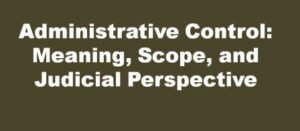Administrative Control: Meaning, Scope, and Judicial Perspective

Administrative Control: Meaning, Scope, and Judicial Perspective
By reading the following article on administrative control, readers might not have any doubt on the service condition of employees.
Understanding Administrative Control
Administrative control means the authority to direct, supervise, and regulate the functioning of subordinates or administrative machinery.
It includes all actions necessary to ensure compliance, efficiency, and lawful functioning of public service systems.
Scope of Administrative Control
The term "control" has a wide connotation, covering powers necessary to implement lawful objectives of the controlling authority.
It includes powers like supervision, transfer, suspension, disciplinary proceedings, termination and altering prior administrative decisions when required.
Control Includes Suspension Power
The Supreme Court in Corporation of Nagpur v. R.C. Modak held that "control" includes the power to suspend employees.
This power can be used pending disciplinary proceedings to ensure neutrality and efficiency. (AIR 1984 SC 626)
Transfer Is Also Within Control
The Full Bench of Patna High Court held in Dhirendra Kumar v. Bihar Agricultural Marketing Board that control includes power to transfer.
The authority can transfer employees for administrative efficiency. (1985 Lab IC 21 FB)
Regulatory Power ≠ Disciplinary Power
Regulating work doesn't mean power to remove or punish unless expressly given by law.
In Marathwada University v. S.B.R. Chavan, the Supreme Court held that regulatory powers don’t include disciplinary removal. (AIR 1989 SC 1582)
Charge-Sheet Can Be Issued by Controlling Officer
Even if someone is not the designated Disciplinary Authority, they may issue charge-sheets under administrative control.
This was upheld in P.V. Srinivasa Shastry v. C&AG of India, (AIR 1993 SC 1152; 1993 2 SCC 327)
Disciplinary Action Falls Under Administrative Control
The authority under administrative control can initiate and complete disciplinary proceedings.
This was affirmed in G.S. Nagmati v. State of Mysore, (1979) 3 SCC 325 and B. Mishra v. Orissa High Court, AIR 1976 SC 1899.
Amending Administrative Orders
The Government can alter or replace prior administrative orders, unless restricted by statute.
In Union of India v. M. Jangamayya, the Supreme Court held such administrative instructions aren’t statutory and can be changed. (AIR 1977 SC 757)
Delegation of Administrative Function
Administrative powers must be exercised by the competent authority unless the law allows delegation.
In Pradyat Kumar Bose v. Hon'ble Chief Justice of Calcutta High Court, the Supreme Court stressed non-delegability of ultimate responsibility. (AIR 1965 SC 285)
Authority of Administrative Instructions
Administrative instructions must be issued by competent authorities.
In Nagmal Singh Yadav v. R. Ramayya, the Supreme Court held that validity depends on competence and due process. (AIR 1979 SC 1474)
Communication Is Essential
An order must be communicated to become legally effective and executable.
In P.K.S. Srivastava v. Union of India, the Delhi High Court held non-communication invalidates the effect of the order. (2017(1) SLJ (Delhi) 244)
Article 226 and Administrative Control
The Apex Court ruled that the Administrative control includes powers like suspension and transfer as held in multiple judicial decisions.
Suspension pending inquiry is lawful under "control", per Corporation of Nagpur v. R.C. Modak, AIR 1984 SC 626.
Delegation of Inquiry Is Not Delegation of Power
Entrusting a subordinate to conduct an inquiry is not delegation of power.
This is the normal method of administrative functioning and doesn't violate principles.
Conclusion
Administrative control encompasses a wide spectrum of lawful authority such as supervision, discipline, suspension, and transfer.
Courts have upheld its wide reach through consistent rulings for effective public administration and constitutional governance.
A good service matter lawyer in Jaipur must aware about the administrative control of employees to examine the validity of charge sheet.
Frequently Asked Questions on Administrative Control
There are few frequently asked questions for clear understanding of the Cases.
Q1. What is meant by 'Administrative Control'?
Ans. Administrative control refers to the authority to supervise, regulate, and manage subordinates or departments for lawful, efficient functioning.
Q2. Does the power of ‘control’ include the power to suspend an employee?
Ans. Yes. The Supreme Court in Corporation of Nagpur v. R.C. Modak (AIR 1984 SC 626) held that suspension falls within the scope of "control".
Q3. Can a controlling officer issue a charge-sheet even if not the disciplinary authority?
Ans. Yes. In P.V. Srinivasa Shastry v. C&AG of India (AIR 1993 SC 1152), the Court upheld this action under administrative control.
Q4. Is the power to regulate officers’ work same as the power to remove them?
Ans. No. Marathwada University v. S.B.R. Chavan (AIR 1989 SC 1582) clarified that regulating work doesn’t include disciplinary removal powers.
Q5. Can administrative orders be modified or altered later?
Ans. Yes. In Union of India v. M. Jangamayya (AIR 1977 SC 757), the Court held that administrative instructions can be changed by the government.
Important Case law related Questions on Administrative Control
Q6. Who must issue administrative orders for them to be valid?
Ans. Only the competent authority can issue valid administrative instructions, as held in Nagmal Singh Yadav v. R. Ramayya (AIR 1979 SC 1474).
Q7. Is communication of an administrative order essential?
Ans. Yes. In P.K.S. Srivastava v. Union of India (2017(1) SLJ (Delhi) 244), the Court held that an uncommunicated order is not enforceable.
Q8. Does the word ‘control’ also include the power to transfer an employee?
Ans. Yes. The Patna High Court in Dhirendra Kumar v. Bihar Agricultural Marketing Board (1985 Lab IC 21 FB) affirmed this.
Q9. Can an administrative authority delegate inquiry to a subordinate?
Ans. Yes. Delegation for inquiry is valid, but ultimate responsibility remains with the authority (Pradyat Kumar Bose, AIR 1965 SC 285).
Q10. Why is administrative control important in public governance?
Ans. It ensures discipline, accountability, and lawful execution of duties, helping maintain efficiency and transparency in public administration.
